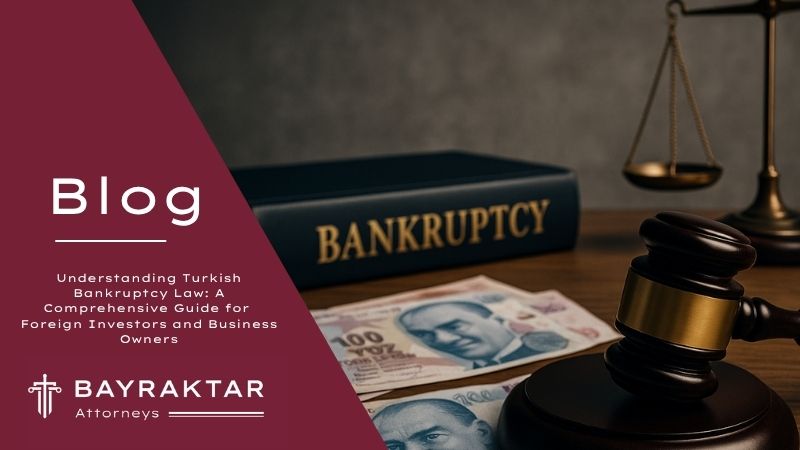
Bankruptcy proceedings in Türkiye are governed by detailed legal procedures designed to protect creditors’ rights while offering fair treatment to debtors. For foreign investors and companies operating in Türkiye, understanding Turkish bankruptcy law is crucial in managing financial risk and ensuring legal compliance during business operations.
In this guide, we explain the fundamentals of bankruptcy law in Türkiye, the types of bankruptcy proceedings, who can initiate them, and what international companies should know about creditor claims, asset protection, and legal remedies.
Types of Bankruptcy in Türkiye
Ordinary Bankruptcy Proceedings
Ordinary bankruptcy (adi iflas) applies to merchants and commercial entities registered with a trade registry. It is typically initiated when the debtor fails to meet financial obligations and is unable to pay due debts. It can be filed by creditors or the debtor voluntarily.
Bankruptcy by Way of Attachment
This type of bankruptcy is initiated when a creditor has already obtained a writ of execution against the debtor through enforcement proceedings and the debtor fails to pay. If asset seizure or payment fails, the creditor can file for bankruptcy.
Direct Bankruptcy Filing
In cases of obvious insolvency, such as when a company halts payments or suspends operations due to lack of liquidity, bankruptcy can be filed directly without prior enforcement attempts.
Who Can Be Declared Bankrupt?
In Türkiye, bankruptcy can be declared against:
Real persons engaged in trade
Legal entities such as companies
Cooperatives
Certain individuals who act as partners with unlimited liability (e.g., general partners in commandite companies)
Legal Procedures and Timeframes
Filing a Bankruptcy Petition
The process begins with a petition filed by either the creditor or debtor to the competent Commercial Court of First Instance. Evidence of insolvency or non-payment must be presented.
Temporary Precautionary Measures
Upon reviewing the petition, the court may issue temporary measures such as freezing bank accounts, halting asset sales, or assigning a temporary administrator to safeguard assets.
Bankruptcy Decision
If the court finds the petition valid, it declares the debtor bankrupt. This decision is published in the Turkish Trade Registry Gazette and other official platforms to inform all interested parties.
Consequences of Bankruptcy
Bankruptcy triggers the following outcomes:
All assets of the debtor are collected into the bankruptcy estate (iflas masası).
Legal proceedings and enforcement by individual creditors are suspended.
Creditors must register their claims with the bankruptcy office.
Debtor loses the right to dispose of assets.
Order of Claims
Claims are paid in the following priority:
Secured creditors (with pledge or mortgage rights)
Employees (limited)
Tax debts
Unsecured creditors
If insufficient assets are available, unsecured creditors may recover only a portion or none of their claims.
Concordatum as an Alternative to Bankruptcy
Concordatum (konkordato) is a debt restructuring mechanism that allows debtors to avoid bankruptcy by proposing a repayment plan to creditors under court supervision. It’s an increasingly preferred method, especially for large corporations.
The procedure includes:
Application to the court
Appointment of a concordatum commissioner
Provisional protection
Creditors’ meeting and voting
Court approval or rejection of the plan
Cross-Border Bankruptcy Considerations
Although Türkiye is not a party to the EU Insolvency Regulation, it recognizes some foreign bankruptcy judgments under bilateral or multilateral treaties or based on reciprocity. International companies with Turkish assets or operations may face parallel proceedings in Türkiye under local law.
Why Legal Representation Is Essential
Bankruptcy in Türkiye involves strict deadlines, court filings, and creditor representation. At Bayraktar Attorneys, we assist foreign clients with:
Filing or opposing bankruptcy claims
Representing creditor interests in liquidation or concordatum
Preventive legal planning to avoid insolvency
Cross-border asset protection and claim enforcement
Final Thoughts
Bankruptcy law in Türkiye is a vital part of commercial regulation that foreign investors and local business owners should understand thoroughly. From creditor protection to restructuring options, proper legal planning and representation can reduce financial losses and safeguard long-term investments.
If you’re dealing with financial distress, creditor disputes, or business insolvency in Türkiye, contact Bayraktar Attorneys for strategic, multilingual legal support tailored to your case.






